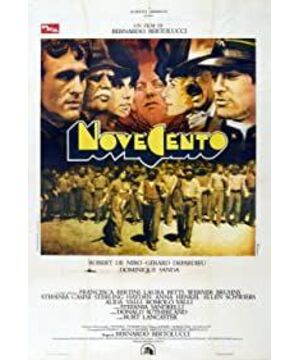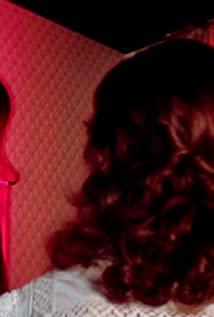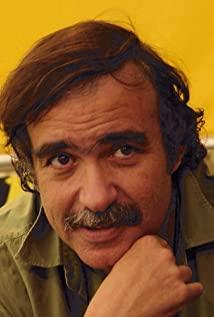When I first watched "The Pianist at Sea" (1998) more than ten years ago, it was a very good viewing time, and I was really immersed in that 169 minutes. "The Pianist at Sea" is an emotional and audio-visual masterpiece, but it is definitely not a great movie. More than ten years later, I rewatched the film on the big screen, and the better audio-visual effects and deeper immersion made me more sure of this, "The Pianist at Sea" is delicious, but it doesn't make me aftertaste endless.
And another Italian film master Bernardo Bertolucci's epic masterpiece "Nineteen Zero" (1976) is a film that makes me reminisce a lot, a "great film". Compared with "1900", "The Pianist at Sea" is just a small fresh, small and lucky work.
From content to style, "1900" and "The Pianist at Sea" are not comparable, so why would I compare them together? That is naturally because they have a common "1900". Besides, they are all Italian films.
In "1900", "1900" is the starting point of a century and an era; in "Sea Pianist", "1900" is a person and the starting point of this life. From this, we can already see the distinction between the two films. "1900" is about history, the trend of the times, and the fate of the group.
The narration of the two films has basically the same starting point in time, and it is interesting that the temporal end point of their narration is also relatively close - after the end of World War II. In other words, the stories they tell are actually in the same time and space span. The difference is that what we see in "1900" is the "history of class struggle" in the first half of the 20th century and the love and hatred of people who are deeply involved in it; but we do not see it in "The Pianist at Sea". In the smoke of history, apart from a little bit of unreachable love, there is only a romantic "monologue" of personality and music.
"The Pianist at Sea" is a film that is deeply loved by Chinese fans, ranking 13th on a rating website. It is a "magical work" in the hearts of countless literary and artistic youths. The images and music of "The Pianist on the Sea" are very good, with great rendering and appeal, and it is difficult for young literary and artistic people not to be "captured" by it.
From birth to death, "1900" never left the Virginia cruise ship, but in the "small" cruise ship, he lived out his true "self" and enjoyed infinite "narcissism", which happened to be The psychological demands of the majority of literary and artistic youths. Even the confusion and withdrawal when he walked down the gangway can also become the "spiritual victory method" for the vast number of literary and artistic youths.
"The Pianist at Sea" is also a masterpiece in Europe and the United States, but it is not widely regarded as a fine wine, probably because most of the young literary and artistic young people in Europe and the United States have crossed the primary stage of "self" and "narcissism". For young literary and artistic youths in the primary stage of socialism, "The Pianist at Sea" is a "light meal" for vegetarians, and it tastes particularly "petty bourgeoisie".
"1900" is naturally not a "light meal", but a heavy-duty "Italian meal" with a mix of history, personal destiny, sex and violence. The "taste" of "1900" even led to its partial ban.
Bernardo Bertolucci is good at making epic films with a large format, "Nineteen Zero" and "The Last Emperor" (1987) as well. But he has also made many small-scale films, such as "Last Tango in Paris" (1972), "Stealing Incense" (1996), etc. In these films, Bernardo Bertolucci's performance of sex Always daring and even crazy, its purpose is very different from Giuseppe Tonadore's relatively subtle performance - even in "Sicilian Beauty" (2000), the theme of "sexual fantasy", Giuseppe Tonadore Tonadore's performance was also much more "gentle" than Bernardo Bertolucci's.
It can be said that Bernardo Bertolucci and Giuseppe Tonadore are two Italian film masters who have little interaction. They are like two top chefs with different cuisines, cooking techniques and dishes they are good at. are very different.
However, "1900" became their intersection, in the narrative of the first half of the twentieth century, one chose a grand and complex historical narrative, and the other chose to cultivate a romantic enclave.
As far as I am concerned, I tasted the five flavors of "sour, bitter, sweet, pungent and salty" in "1900". Moreover, the five flavors are mixed, the layers are repeated, and they sometimes intersect. , can not be digested for a long time, never let go. "Sea Pianist" is more like a cup of coffee or milk tea with good taste. After drinking it today, you can have another cup tomorrow.
Bernardo Bertolucci was born in 1941, Giuseppe Tonadore was born in 1956, they are 15 years apart, and "Nineteen Zero" and "Sea Pianist" are 22 years apart. There is a "generation gap" with them, but Giuseppe Tonadore, as a director full of cinephile spirit (please refer to "Paradise Cinema" [1988]), "The Pianist at Sea" (aka : "The Legend of 1900") is a tribute to "1900" - he made "1900" a "small era".
View more about 1900 reviews











